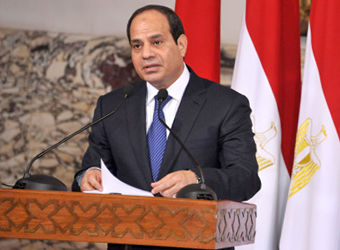President Abdel Fatah al-Sisi hailed the Egyptian people on the fourth anniversary of the mass protests on 30 June 2013, saying they should be proud of what has been achieved so far, but that there is still a long way to go.
Sisi said in a televised speech that the government has achieved much since 2013, specifically in “fighting terrorism, confronting foreign powers that support terrorism and economic development”.
Friday marks four years since millions of Egyptians took to the streets to protest the rule of Islamist president Mohamed Morsi, who had been elected one year earlier.
Morsi, who was removed from office on 3 July 2013 and tried on various charges, has been incarcerated ever since.
“30 June is a unique example of popular revolution, as the people demanded change and the institutions responded,” the Egyptian president said, adding that Egyptians also took a stance against terrorism in their protest.
“Four years on, we see a lot of sacrifices from security forces… and we continue to fight terrorists until victory,” El-Sisi said.
Hundreds of Egyptian security personnel have been killed in attacks by Islamist militants on army and police forces – mostly in northern Sinai – in the last four years, while the military has killed hundreds of insurgents as part of its ongoing campaign to end the insurgency in North Sinai.
Sisi said in his speech that after 30 June, “Egypt regained its leading international role, standing against countries that support terrorism and standing by countries rebuilding their institutions.”
Sisi also said that electing a new parliament in 2015 was a political success for Egypt.
On the economic front, Sisi said that the government has “launched mega development projects across Egypt… We also implemented an economic programme that is changing the reality of Egypt and resolving the economic crisis.”
In mid-2014, Egypt launched a plan to introduce fiscal reforms, including levying new taxes and fuel subsidy cuts – the latest of which were announced on Thursday – to ease a growing budget deficit – currently estimated at 12.2 percent of GDP – as well as floating the Egyptian pound in November 2016.
The first increase of fuel prices came in November, shortly after the pound flotation, raising prices up to 78 percent.
“Changing the status quo requires a long time, but we are already seeing improvement in economic indicators and in the atmosphere of investment and economic growth,” he said.
“I salute the people for bearing the hard measures that we had to take… I am confident in the future,” Sisi concluded.


